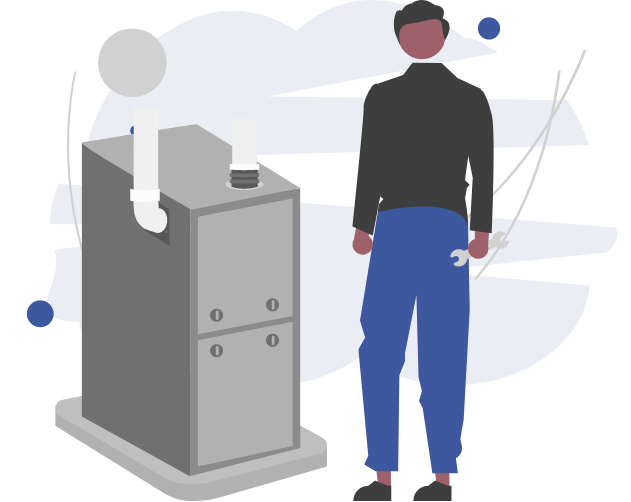When you are in need of furnace repair in Richardson, TX, you undoubtedly want it to happen as quickly as possible. With emergency heating repair services, you’ll have access to the help you need at any time of the day or night, even on holidays. Winters in this part of the country are known for being quite cold, so a heating system that works properly is essential to your comfort level while at home. If your furnace goes out on you unexpectedly, it could leave your home frigid at a time when you most need additional warmth. Read on to learn more about heating repair and how to tell when your system needs it.
Furnace Repair in Richardson, TX
(Normally $129)Call For Details

Fast and Affordable Heating Repair in Richardson
Typically, furnaces last for about 20 years before needing to be replaced. However, it isn’t necessarily reasonable to expect them to work perfectly throughout their entire lifespan. You’ll need to keep up with regular maintenance, as well as periodic repairs to keep everything running smoothly. Properly caring for your furnace will also keep it operating as efficiently as possible, keeping your energy costs in check. As your furnace deteriorates over the years, it can lose efficiency, especially when compared with newer models, so giving it the care it needs is crucial.
In general, it is best to deal with any heating system troubles as soon as you become aware of them. Left unchecked, minor issues can soon turn into major problems, which can significantly add to the difficulty, cost, and time needed for the repairs. When you address problems early on, you can minimize system downtime while also saving money.
- Unusual noises or smells from vents or equipment
- System short-cycling, staying on too long, or not starting up
- Cold air coming from vents
- Weak or sporadic air flow
- Unexpected increases in heating costs
Of course, this list is not exhaustive but encompasses some of the most common troubles Richardson homeowners have with their furnaces. If you suspect anything is not quite right with your heating system, don’t delay in calling for service. A technician will start by inspecting your entire heating system to identify and locate any trouble areas so that they can create a plan and cost estimate for the repairs. This way, you’ll have an understanding of what to expect throughout the entire process.
Common Furnace Problems
Squealing, growling, scraping, and drumming sounds are all indications of a mechanical problem, blocked burner, or airflow loss. Noisy drumming sounds could suggest that the blower requires lubrication while squeaking could tell to a damaged blower belt. An unattached blower motor can lead to loud grinding, while dirty burners will produce a loud sound. Finally, rumbling sounds may be an indication that the bearings need repairs. Because it can be tough to pinpoint the reason for the strange noises with no experience, hire a professional technician to check the furnace system, and fix the problems.
If your furnace system is not giving off warm air, there are some steps you can do. Firstly, ensure the blower has no dirt and check the thermostat to correct the temperature. Before cleaning up the air filter, examine the circuit breakers to make sure there is a source of power. As usual, if you cannot make the improvements on your own, contact an HVAC company to check your system. A skilled professional can assess the problems correctly and suggest tips on how to bring back your furnace system at its optimum efficiency.
If you observe a drop in heat production, first ensure the air filter has no dust or dirt and is in functional status. Then, check other parts of the furnace system for any accumulation of debris, and grime, a cheaper repair can enhance the performance of the system. Besides, inspect the air vents and ducts from blocking. Lastly, ensure the thermostat is operating and set rightly. Try shifting the location of the thermostat away from direct sunlight, for it affects the readings and can lead to misreading the temperature in your house. If it happens, it will leave your home in the cold and shut off the furnace earlier than expected. You may also inspect the insulation to ensure that hot air does not blow off from your space by many openings.
There are several reasons why it happens. You can attend to this issue alone without the help of a professional. You can begin by opening the heat registers and then checking the thermostat settings. Then, inspect the power, restart the system, or inspect the service door. You can also check the filter to ensure it has no dust or dirt and inspects the pilot light to see if it has a fire.
Richardson’s Top Choice for Furnace Repair
Dring Air Conditioning & Heating has been in business in the local area since 1953, giving us seven decades of experience worrking on all types and brands of furnaces. You can trust our team for our expertise and high-quality workmanship. As a family-owned business, we truly value all of our customers, whether you come to us for minor repairs or major overhauls. You’ll get the same level of customer service and attention to detail no matter the size and complexity of the job.
When you work with us, you can rest assured that we will get the job done right the first time. Your comfort in your Richardson home is our top priority, and we’ll never leave a job not completed up to our high standards. We are proud of the reputation that we have built as one of the area’s premier HVAC contractors, and we want to ensure your complete satisfaction with our work.
For all your heating repair needs in Richardson, call on Dring Air Conditioning & Heating. Reach out today for a free consultation and heating system inspection.
©2025 Dring Air Conditioning & Heating. All Rights Reserved. License: #TACLB00014795E. Privacy Policy Web Design and Internet Marketing by RYNO Strategic Solutions






